Long Island MacArthur Airport
| Long Island MacArthur Airport | |||||||||||||||||||||||
|---|---|---|---|---|---|---|---|---|---|---|---|---|---|---|---|---|---|---|---|---|---|---|---|
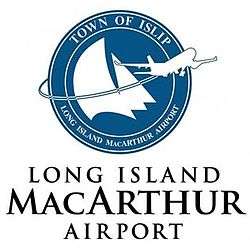 | |||||||||||||||||||||||
| IATA: ISP – ICAO: KISP – FAA LID: ISP | |||||||||||||||||||||||
| Summary | |||||||||||||||||||||||
| Airport type | Public | ||||||||||||||||||||||
| Owner/Operator | Town of Islip, New York | ||||||||||||||||||||||
| Serves | Long Island, New York metro area | ||||||||||||||||||||||
| Location |
100 Arrival Avenue Ronkonkoma, New York | ||||||||||||||||||||||
| Elevation AMSL | 99 ft / 30 m | ||||||||||||||||||||||
| Coordinates | 40°47′43″N 073°06′01″W / 40.79528°N 73.10028°W | ||||||||||||||||||||||
| Website | www.MacArthurAirport.com | ||||||||||||||||||||||
| Map | |||||||||||||||||||||||
 ISP | |||||||||||||||||||||||
| Runways | |||||||||||||||||||||||
| |||||||||||||||||||||||
| Helipads | |||||||||||||||||||||||
| |||||||||||||||||||||||
| Statistics (2005, 2010) | |||||||||||||||||||||||
| |||||||||||||||||||||||
Long Island MacArthur Airport (also known as Islip Airport) (IATA: ISP, ICAO: KISP, FAA LID: ISP) is a public airport on Long Island, in Ronkonkoma, Town of Islip, Suffolk County, New York. Shuttle buses connect the airport to the Ronkonkoma Railroad Station. Long Island MacArthur Airport (LIMA) covers 1,311 acres (531 ha) and has four runways and two helipads.[1] The Town owns and operates the airport, which serves about two million commercial passengers a year, as well as general aviation.
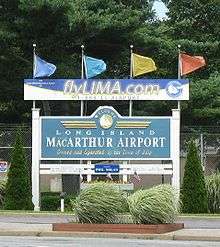
Located between Montauk Point 72 miles (116 km) to the east and Manhattan 60[2] miles (97 km) to the west, MacArthur Airport serves the three million residents of Nassau and Suffolk counties and travelers who want an alternative to the congestion at JFK and LaGuardia airports – both in Queens.[3]
The FAA designated LIMA an Official Metro Airport in early 2011,[4] meaning it is now grouped with LaGuardia, JFK and Newark in travel and informational searches for New York airports, providing better exposure to the traveling public. MacArthur Airport, which does not share the congested air space of the city-centric airports, has an exceptional record of on-time performance. During 2009 83.6% of flights arrived on time and 85.6% of flights departed on time.[5]
During 2007 the airport served more than 2.3 million commercial passengers.[6] In 2007 the airport had 182,142 aircraft operations, an average of 499 per day; 80 percent general aviation; 15 percent scheduled commercial; five percent air taxi and about one percent military. 243 aircraft are based at the airport: 63% single-engine; 10% multi-engine; 19% jet aircraft; seven percent helicopters; and less than one percent military.[6] The Town-owned Foreign Trade Zone is next to airport property.
History
In April 1942, four months after the bombing of Pearl Harbor, the Town of Islip contracted with the federal government to build an airfield on Town-owned land for military use.[7] Within months the Civil Aeronautics Administration – predecessor to today's Federal Aviation Administration – funded construction of three paved runways. Originally named Islip Airport, at the suggestion of Charles H. Duryea, a local elected official, the airport was renamed MacArthur Airport, after General Douglas MacArthur, General of the Army.[7]
In 1944 Lockheed Aircraft Corporation built the first hangar at the airport. Five years later the Town built the airport's first terminal building preparing for airline flights. Through the 1950s the Sperry Corporation conducted aerospace research at the airport.
In 1960 Allegheny Airlines (AL) was the first airline with scheduled flights from the field to Boston, Philadelphia and Washington. The March 1961 Official Airline Guide shows five weekday Convair departures: a nonstop to Washington National, one to Baltimore, and three flights making two or three stops to Boston. The General Douglas MacArthur Terminal was completed in 1966; in 1967 Mohawk started two FH227s a day to Bridgeport and Albany and beyond (one continued to Toronto). In 1971 American Airlines began non-stop 727s to Chicago.
Several airlines have ended service over the years, but between 1999 and 2009 passenger traffic grew with the airport now serving about two million passengers a year on two carriers: Southwest Airlines and US Airways Express.
Continental Express and Continental Connection had non-stops to Albany and to Cleveland but ended them in 2005. Spirit Airlines scheduled flights to several Florida cities and Detroit, before moving to LaGuardia Airport in 2001; in May 2008 the airline resumed service to Fort Lauderdale from MacArthur only to drop it soon after.[8][9] Delta Express, which had nonstops to Orlando and Fort Lauderdale, dropped MacArthur Airport in 2003 after a decline in traffic. Delta Connection to Atlanta ended on May 1, 2008 following a mid-April announcement that Delta and Northwest Airlines were planning to merge – a move that led to changes for the merged airline.
As of January 2014 Southwest Airlines has year-round non-stops to Baltimore, Fort Lauderdale, Orlando, Tampa, and West Palm Beach, and seasonal service to Fort Myers. Allegiant Air has 2 seasonal weekly flights to Fort Myers/Punta Gorda, FL. PenAir began operating 2 daily nonstop flights to Boston in July 2013, but stopped flying to MacArthur a year later. The only legacy carrier at the airport is American Airlines to Philadelphia. Service to Washington-National ended on July 2, 2014 after the merger between US Airways and American Airlines. The newly merged airline had to cut service to 17 cities from Washington-National because of an antitrust lawsuit preventing the airline from monopolizing slots at National Airport. American Airlines then reapplied for nonstop service between MacArthur Airport and Washington-National because two slots opened up at the airport. However, it was confirmed in early 2015 that the airline lost the bid for these two slots.[10]
Passenger enplanements and operations
Following the September 11, 2001 attacks MacArthur Airport saw a 25 percent decrease in passenger traffic. Passenger traffic later increased, but they decreased again in 2006. Charts depicting annual operations and passenger enplanements are in appendix C and D. In the year 2005 MacArthur Airport had 173,135 total operations; during this year 1,055,832 passenger were enplaned, 7.07 percent more than 2004. In 2006 MacArthur had 189,390 total operations with 1,138,061 passenger enplanements. The year 2007 brought total operations at MacArthur down to 184,760 but passenger enplanements increased to 1,167,515, MacArthur's highest enplanements in the last 6 years. In 2008, total operations at MacArthur were 179,230 and passenger enplanements were down to 1,048,768; in 2009, 159,736 total operations and 929,902 passenger enplanements. From 2005 to 2009 almost every category of MacArthur's operations has declined: airline, military, air taxi, and general aviation. A recent figure was released citing a 46.4% decrease from 2007 to 2012, the most loss in any small hub airport.[11]
Growth in the 21st century
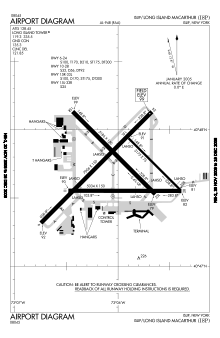
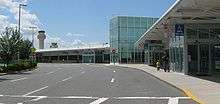
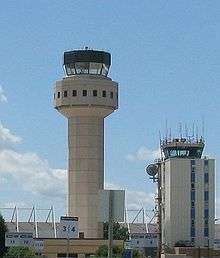

Established about midway through the 20th century, by the end of the century MacArthur Airport had been completely transformed. Growth and expansion continued in the early years of the 21st century, but by 2014 the airport was experiencing financial difficulties.[13]
In 2004 MacArthur Airport embarked on an expansion that included a Southwest Airlines terminal built by the airline at a cost of $65 million. Phase one of the expansion included four gates to be used by Southwest, as well as space for shops and restaurants. Phase two, completed in November 2006, added four more gates for a total of eight new gates. Prior to the expansion project, passengers had to pass back through the ticketing area of the airport to reach the baggage claim area. With completion of Phase two, the new concourse provided a more convenient exit point to baggage claim, ground transportation and the airport's roadway exit. Nevertheless, the location of the baggage claim area still requires most travelers using the airport's long-term parking lots to still pass back through the ticketing area of the airport to reach their vehicles.
A major proponent of the airport's 2004–2006 expansion projects was Peter J. McGowan, then the Islip Town Supervisor; the new concourse was named after McGowan. When in March 2006 he resigned, the terminal was renamed Veterans Memorial Concourse in homage to Long Island's distinction as home to more military veterans than almost any other community in the United States.
While no further expansion is planned for the interior of the terminal building, other projects are underway. A new control tower was completed in 2010 and opened in 2011 to replace the outdated tower built in the early sixties. In 2010 a new state-of-the-art Fuel Farm will increase the airport's jet fuel supply. The airport has plans to reconfigure the roadway in front of the terminal; another taxiway is planned along with other airfield projects using FAA airport improvement program funds. Development of the airport's West Side, home to a thriving general aviation sector, will get underway in late 2010.
While the airport continues to expand it has added numerous amenities, including free courtesy cell phone parking (located in the rear of Lot 6B). In November 2009 MacArthur Airport became the only airport in the Tri-state region to offer free wireless in the entire terminal and in the courtesy cell phone parking lot.[14] In addition, the airport launched several tools designed to provide up-to-date information to travelers, including: the airport's first official Website – www.flyLIMA.com. All passenger food catering within the airport terminal is provided by HMSHost, which operates five restaurants.
Airlines and destinations
MacArthur Airport currently has two concourses in one main terminal. Concourse A has 8 gates (A1-A8) and concourse B has 9 gates (B16-B24).
Passenger
| Airlines | Destinations | Concourse |
|---|---|---|
| American Eagle | Philadelphia | A |
| Southwest Airlines | Baltimore, Fort Lauderdale, Orlando, Tampa, West Palm Beach | A |
Statistics
Top destinations
| Rank | City | Passengers | Carriers |
|---|---|---|---|
| 1 | Baltimore, Maryland | 174,000 | Southwest |
| 2 | Orlando, Florida | 144,000 | Southwest |
| 3 | West Palm Beach, Florida | 99,000 | Southwest |
| 4 | Fort Lauderdale, Florida | 73,000 | Southwest |
| 5 | Tampa, Florida | 64,000 | Southwest |
| 6 | Philadelphia, Pennsylvania | 30,000 | American |
| 7 | Fort Myers, Florida | 4,000 | Southwest |
| 8 | St. Louis, Missouri | 1,000 | N/A |
| 9 | Denver, Colorado | 1,000 | N/A |
| 10 | Chicago–Midway, Illinois | 1,000 | N/A |
Administration
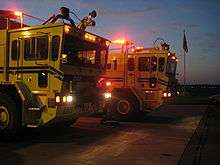
Long Island MacArthur Airport is owned and operated by the Town of Islip. The Department of Aviation is led by the Commissioner of Aviation and Transportation, who works closely with the Town Board to manage and steward the airport. Departments include Airport Operations, Custodial, Fire Rescue, Law Enforcement, Maintenance, and Public Affairs.
Tenants
Long Island MacArthur Airport's West Side houses numerous general aviation tenants, including three fixed based operators: Sheltair Aviation, ExcelAire, Liberty Jet Management and Mid Island Air, which offer a full range of general aviation services. ATP Flight School is also a tenant of the airport, offering flight training for the area.
The Suffolk County Police (SCPD) Aviation Section has a Law Enforcement and MEDEVAC helicopter based at MacArthur Airport. The base is staffed 24 hours a day by Police Pilots, as well as Flight Paramedics employed by the Stony Brook University Medical Center.
Until the early 1990s, the 2nd Battalion (Attack), 142nd Aviation Regiment of the N.Y. Army National Guard's 42nd Infantry Division Aviation Brigade, was based at MacArthur Airport, equipped with Bell AH-1F Cobra helicopters. In 2006, the 3rd Battalion (Assault), 142nd Aviation Regiment moved its headquarters from Latham, N.Y. to Long Island MacArthur Airport, bringing its Sikorsky UH-60L Black Hawk helicopters. In May 2007, following yet another reorganization in which the battalion was re-configured, the unit received its mobilization alert order to participate in Operation Iraqi Freedom. Over the course of their deployment, the unit – which came to be known as Task Force Jester – flew more than 15,000 flight hours. The last of the battalion's troops returned home to Long Island MacArthur Airport in May 2009.
It is also home to Civil Air Patrol's Long Island Group's Suffolk Cadet Sqdn 10, which is also headquartered at the airport.
Accidents and Incidents
There has been only one deadly accident at MacArthur Airport: On April 4, 1955, a Douglas DC-6 of United Airlines operating on a pilot test flight bound for LaGuardia Airport lost control soon after take-off and subsequently crashed, killing all three crew members on board.[16][17]
Ground transportation
MacArthur Airport is connected with the nearby Long Island Rail Road station at Ronkonkoma by shuttle buses. The LIRR offers passengers transportation to nearby New York City. The LIRR currently offers a discount package for airport passengers, which includes the cost of shuttle service between the train station and airport terminal.[18]
Taxi, rental car, and limousine service is available, too. Five national rental car companies serve the airport. Many hotels in the surrounding area also provide shuttle service to and from the airport, including the Holiday Inn – Long Island Islip Airport located on airport property less than five minutes from the terminal building.
Suffolk Transit's S57 route serves the airport, connecting it with Sayville and the Smith Haven Mall, located in Lake Grove, New York.
The Hampton Jitney's Westhampton, Montauk, and North Fork lines stop along the Long Island Expressway (Interstate 495) at Exit 60. It is called the Islip Airport Connection, and is a short cab ride away from the airport terminal.
The 7Bus commuter bus service to New York City has a local stop minutes from the airport at the Courtyard by Marriott.
Popular culture
Long Island MacArthur Airport has been used several times as a filming location:
- In the 1970 The Out-of-Towners, the airport scene, in which George Kellerman (Jack Lemmon) and his wife Gwen (Sandy Dennis) depart Ohio for New York
- In 2008, several scenes for the independent film Every Day, starring Helen Hunt, Liev Schreiber, and Brian Dennehy
- In 2009, Comedy Central promotional commercials for comedian Mike Birbiglia's nationwide tour and television special, I’m in the Future Also
- Scenes for the 2010 FX comedy Louie
- In August 2010, scenes for a documentary about behavioral pharmacologist Victor DeNoble, Addiction Incorporated
- In 2011, Sean Paul's clip She Doesn't Mind
- In 2012, part of the movie Non-Stop in various locations
- In 2014, scenes from Ricki and the Flash were filmed at the airport [19]
See also
References
- 1 2 FAA Airport Master Record for ISP (Form 5010 PDF), effective July 5, 2007
- ↑ Long Island Macarthur Airport http://www.nyctourist.com/long-island-islip-macarthur-airport.htm. Retrieved Sep 4, 2015. Missing or empty
|title=(help) - ↑ Newsday, January 10, 2010, "The Little Airport That Could"
- ↑ "About MacAuthur Airport". Town of Islip. Retrieved July 1, 2013.
- ↑ Department of Transportation, Bureau of Transportation Statistics
- 1 2 LIMA Administrative Records
- 1 2 Suffolk County News Archive, April 3, 1942
- ↑ Spirit Air considering ISP service to FLL
- ↑ Spirit Airlines Attacks Record Fuel Prices
- ↑ http://www.timesunion.com/news/article/American-Airlines-loses-bid-to-restore-6001385.php
- ↑ "Southwest Airlines: No plans to leave MacArthur". Newsday.
- ↑ http://www.flylima.com/airportinfo/history
- ↑ "MacArthur Airport struggling to reverse losses". Newsday.
- ↑ MacGowan, Carl, "Cablevision wires MacArthur Airport for Internet access", Newsday, 2009-11-24.
- ↑ "RITA - BTS - Transtats". bts.gov.
- ↑ 1955 MacArthur Airport United Airlines crash
- ↑ Harro Ranter (4 April 1955). "ASN Aircraft accident Douglas DC-6 N37512 Islip-MacArthur Field, NY (ISP)". aviation-safety.net.
- ↑ "MTA LIRR - Deals & Getaways". mta.info.
- ↑ "Meryl Streep films new movie 'Ricki and the Flash' at Long Island MacArthur Airport". Newsday.
External links
| Wikimedia Commons has media related to Long Island MacArthur Airport. |
- The official website of Long Island MacArthur Airport
- FAA Airport Diagram (PDF), effective February 4, 2016
- New York State DOT Airport Diagram PDF
- Resources for this airport:
- AirNav airport information for KISP
- ASN accident history for ISP
- FlightAware airport information and live flight tracker
- NOAA/NWS latest weather observations
- SkyVector aeronautical chart for KISP
- FAA current ISP delay information
| ||||||||||||||||||||||||||